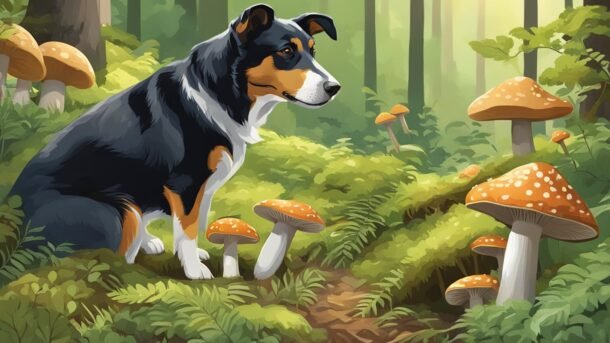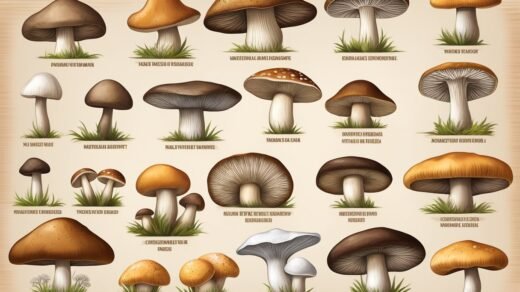Mushrooms are a type of fungi that have been used for medicinal purposes for centuries. They are known for their antioxidant and anti-inflammatory properties, and recent studies have shown that they can be beneficial for dogs as well. However, not all mushrooms are safe for dogs to consume, and some can be toxic and even fatal.
When it comes to feeding mushrooms to dogs, it’s important to know which ones are safe and which ones are not. Some of the most beneficial mushrooms for dogs include shiitake, maitake, reishi, and turkey tail. These mushrooms contain compounds that can help boost the immune system, fight cancer, and improve overall health.
On the other hand, there are several types of mushrooms that are toxic to dogs, such as Amanita, Galerina, and Lepiota. These mushrooms can cause a range of symptoms, including vomiting, diarrhea, abdominal pain, and even liver failure. It’s important for dog owners to be aware of the risks associated with feeding mushrooms to their pets and to avoid giving them any mushrooms that they are not familiar with.
Benefits of Mushrooms for Dogs

Mushrooms are a great source of nutrition for dogs. They contain vitamins, minerals, and other nutrients that are essential for maintaining good health. In addition, mushrooms have been found to have immune-boosting and anti-inflammatory properties, making them a valuable addition to any dog’s diet.
Nutritional Value
Mushrooms are packed with nutrients that are beneficial for dogs. They are an excellent source of B vitamins, including B2, B3, and folate. These vitamins are essential for energy production, healthy skin and coat, and proper nervous system function. Mushrooms also contain minerals such as potassium, phosphorus, and selenium, which are important for maintaining healthy bones, muscles, and organs.
In addition, mushrooms are a good source of dietary fiber, which can help support digestive health in dogs. The soluble and insoluble fiber found in mushrooms can help regulate bowel movements and prevent constipation.
Immune System Support
Mushrooms have been found to have immune-boosting properties, making them an excellent addition to any dog’s diet. They contain beta-glucans, which are complex sugars that have been shown to stimulate the immune system and improve overall health.
Some mushrooms, such as reishi and shiitake, have been found to have anti-inflammatory properties. This can be beneficial for dogs with inflammatory conditions such as arthritis, allergies, and skin irritations.
It is important to note that not all mushrooms are safe for dogs to eat. Some mushrooms, such as the Amanita mushroom, can be toxic and even deadly if ingested. It is important to consult with a veterinarian before adding mushrooms to your dog’s diet.
Overall, mushrooms can be a valuable addition to any dog’s diet. They are packed with nutrients and have been found to have immune-boosting and anti-inflammatory properties. As with any new food, it is important to introduce mushrooms gradually and monitor your dog for any signs of adverse reactions.
Safe Mushrooms for Canine Consumption

Mushrooms are a great source of nutrients and vitamins for dogs. However, not all mushrooms are safe for canine consumption. In this section, we’ll discuss the common edible varieties of mushrooms that are safe for dogs to eat and how to prepare and serve them.
Common Edible Varieties
- Button Mushrooms: Also known as white mushrooms, button mushrooms are safe for dogs to consume. These mushrooms are low in calories and high in protein, making them a great addition to your dog’s diet.
- Portobello Mushrooms: Portobello mushrooms are another safe option for dogs. These mushrooms are rich in antioxidants and contain high levels of potassium and copper.
- Shiitake Mushrooms: Shiitake mushrooms are safe for dogs and are known for their anti-inflammatory properties. These mushrooms are also rich in vitamin B and D.
- Oyster Mushrooms: Oyster mushrooms are a good source of protein and are safe for dogs. These mushrooms also contain high levels of antioxidants.
Preparation and Serving Suggestions
When preparing mushrooms for your dog, it’s important to avoid adding any seasoning or spices that may be harmful to them. Here are some tips for preparing and serving mushrooms to your dog:
- Always cook mushrooms before serving them to your dog. Raw mushrooms can be difficult for dogs to digest and may cause stomach upset.
- Slice mushrooms into small pieces to make them easier for your dog to chew and digest.
- Serve mushrooms as a treat or as a supplement to your dog’s regular meals. Avoid feeding them to your dog as a replacement for their regular food.
- Monitor your dog’s reaction to mushrooms. If you notice any signs of stomach upset or allergic reaction, stop feeding them mushrooms and consult with your veterinarian.
In conclusion, mushrooms can be a healthy addition to your dog’s diet when prepared and served correctly. Stick to the safe varieties listed above and follow the preparation and serving suggestions to ensure your dog’s safety and well-being.
Toxic Mushrooms to Avoid
Mushrooms can be a tasty and nutritious addition to a dog’s diet, but not all mushrooms are safe for dogs to eat. In fact, some species of mushrooms can be extremely toxic and even fatal to dogs. It is important to be aware of which mushrooms are hazardous to dogs and to avoid them at all costs.
Hazardous Species
One of the most dangerous species of mushrooms for dogs is the Amanita phalloides, also known as the death cap mushroom. This mushroom contains a toxin called alpha-amanitin that can cause severe liver damage and even death in dogs. Other hazardous species of mushrooms include Inocybe spp., which can also cause liver damage, and Amanita muscaria, which can cause hallucinations, seizures, and even death.
Signs of Mushroom Poisoning
If a dog has ingested a toxic mushroom, they may show signs of mushroom poisoning. These signs can vary depending on the type of mushroom and the amount ingested. Some common signs of mushroom poisoning in dogs include vomiting, diarrhea, abdominal pain, lethargy, and loss of coordination. In severe cases, dogs may also experience seizures, liver failure, and even death.
If a dog has ingested a toxic mushroom, it is important to seek veterinary attention immediately. The veterinarian may induce vomiting or administer activated charcoal to help absorb the toxins. In severe cases, the dog may need to be hospitalized for supportive care and monitoring.
In conclusion, while mushrooms can be a healthy and delicious treat for dogs, it is important to be aware of which species of mushrooms are toxic and to avoid them at all costs. If a dog shows signs of mushroom poisoning, it is important to seek veterinary attention immediately to ensure the best possible outcome.
Incorporating Mushrooms into a Dog’s Diet
Mushrooms can be a healthy addition to your dog’s diet, but it’s important to choose the right type and feed them in moderation. Here are some guidelines on incorporating mushrooms into your dog’s diet:
Recommended Portions
According to veterinarians, dogs should consume mushrooms in small amounts. A good rule of thumb is to feed your dog one to two small pieces of cooked mushroom per day. It’s important to note that not all mushrooms are safe for dogs to eat, and some can be toxic. Always consult with your veterinarian before adding any new food to your dog’s diet.
Frequency of Feeding
It’s recommended to introduce mushrooms gradually into your dog’s diet, starting with a small amount and increasing over time. It’s also important to monitor your dog’s reaction to the new food. If your dog experiences any adverse reactions, such as vomiting or diarrhea, stop feeding them mushrooms immediately and contact your veterinarian.
Incorporating mushrooms into your dog’s diet can provide nutritional benefits such as vitamins and minerals. However, it’s crucial to choose the right type of mushroom and feed them in moderation. Always consult with your veterinarian before adding any new food to your dog’s diet.
Consulting with a Veterinarian
When incorporating mushrooms into a dog’s diet, it is important to consult with a veterinarian beforehand. While mushrooms can provide a variety of health benefits, some types may be toxic to dogs and can cause serious health problems.
When to Seek Advice
If a dog has a pre-existing medical condition or is taking medication, it is particularly important to seek advice from a veterinarian before introducing mushrooms into their diet. Additionally, if a dog experiences any adverse reactions to mushrooms, such as vomiting or diarrhea, it is important to seek veterinary advice immediately.
Allergy and Sensitivity Considerations
Like humans, dogs can be allergic or sensitive to certain foods, including mushrooms. It is important to monitor a dog’s reaction to mushrooms, particularly if they are trying them for the first time. Signs of an allergic reaction may include itching, swelling, and difficulty breathing. If a dog shows any signs of an allergic reaction, it is important to seek veterinary advice immediately.
Overall, while mushrooms can provide a variety of health benefits for dogs, it is important to consult with a veterinarian before incorporating them into a dog’s diet. By doing so, pet owners can ensure that their dog is receiving the appropriate type and amount of mushrooms and minimize the risk of adverse reactions.




